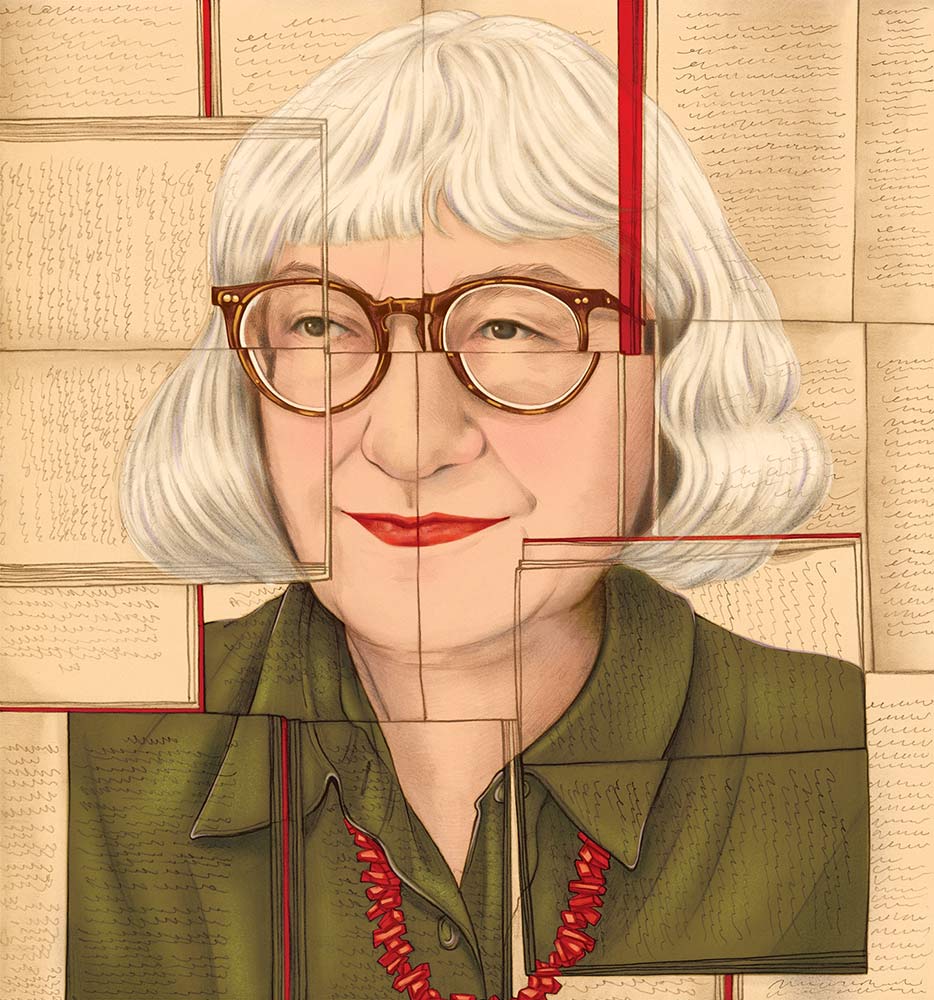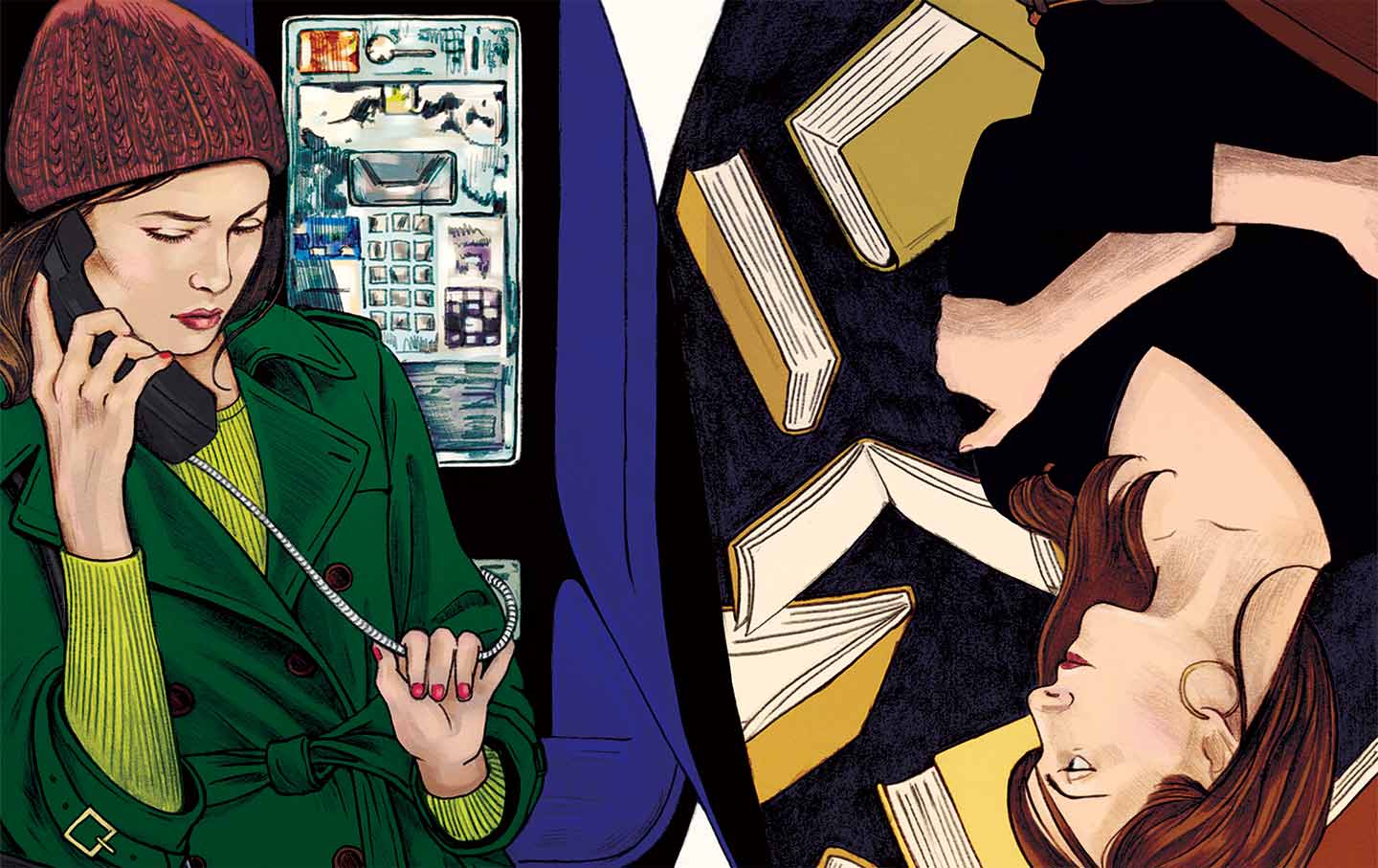A Silver Crown
The cold and forbidding worlds of Cynthia Ozick.
The Cold and Forbidding Worlds of Cynthia Ozick
In a new career-spanning collection of shorter fiction and nonfiction, the past often looms larger for Ozick than the present.

You know you’re in a Cynthia Ozick short story when the wind is merciless and the leaves have dropped. It may already be snowing. In “Bloodshed,” we are greeted by the “icy scenes” that a gun-toting rationalist sees from a Greyhound bus on his way to a “town of the hasidim” outside New York City, where he is ultimately shamed and disarmed by a local rebbe. In “The Biographer’s Hat,” snowflakes adorn the fur collar of a crooked biographer who mouches off a proofreader and persuades her to falsely insert herself into his subject’s history. “A Mercenary” concludes with the haunting vision of a man lying dead “under the stone-white hanging stars of Poland…. Against the stones and under the snow.”
Books in review
In a Yellow Wood: Selected Stories and Essays
Buy this bookThese stories conjure a world that is cold and forbidding. What was once full of fresh promise is now buried. This isn’t to say that Ozick isn’t capable of depicting a fairer climate every now and then—but it will be in Fascist Italy, and a critic, fast approaching middle age, will be made to look catastrophically foolish on every page, as in “At Fumicaro.”
Whatever the season, there is warmth to be found in these stories. But the heat arises from her characters’ intellectual willfulness, however misguided, and in the way their author thwarts or punishes them for it. The willfulness and the punishment are also Ozick’s, and while reading her best stories, you can feel her striving, ecstatic presence everywhere, like belief.
In A Yellow Wood, a career-spanning collection of shorter works selected by the 97-year-old author, showcases 17 short fictions alongside 13 essays. As with the stories, the essays speak from the perspective of winter. They concern themselves with what is buried and past. Aside from two brief autobiographical pieces and a concluding consideration of what an essay is, all revisit the lives of dead writers, many of whom can be introduced by last name alone: Babel, Woolf, Dostoyevsky, Kafka, Eliot. In her politics, too, Ozick has tended to cast a backward glance, and it’s here that she has run into her most serious problems as a writer and thinker. Her Zionism, if not uncommon for a Jewish person of her generation, has also apparently not wavered: Last year, she signed a letter opposing a cultural boycott of Israel amid its ongoing genocide of the Palestinian people. While the fiction and essays under review do not engage with politics directly, they are still shaped by Ozick’s conservative instincts in other ways—her insistence on the unique privileges of genius, her laments about the state of contemporary culture, and her suspicion that the younger generations of novelists can’t match the brilliance of figures like T.S. Eliot and Saul Bellow.
The collection’s title, borrowed from the first line of Robert Frost’s poem “The Road Not Taken,” refers to to the two formal paths that a writer can go down: the story and the essay. “I can, if pressed, devise many reasons for the double presence of stories and essays,” Ozick writes in her introduction, “but they would be inventions, transparent, alibis, made-up stories about non-identical twins.” Pressing herself nonetheless, she offers this distinction: “An essay…is canny. It knows things, or purports to know them. A story begins by knowing nothing, and is compelled to unearth its own meaning.”
This canniness is less a matter of ironclad scholarship, Ozick clarifies, than of voice: The essayist speaks as herself, a character she has had plenty of practice with, while the fiction writer throws her voice around, multiplying and scattering it in the process. Having established her camps, Ozick proceeds to chastise authors of contemporary autofiction who, she believes, have wrested “the almost mystical prestige of the novel for the essayist’s purpose.”
Stories and essays may diverge for all kinds of reasons, but those that appear in this collection tend to wind up at the same destination: suspended in the literary afterlife. Not an ounce of mystical prestige is allowed to escape into the atmosphere. It’s all conserved: publication lust, petty rivalries, largeness of imagination, and audacious magic. Many of Ozick’s characters and subjects are after fame, but not merely that. There’s a metaphysical quality to their yearning. If literature is the religion in which they are devout, then an enduring literary legacy would be heaven.
In this way, Ozick’s characters’ predicaments illustrate how the desire for artistic immortality, like any religious practice, can be superficial and transcendent, painful and pleasurable. Sacrifice is involved. A lifetime of never being satisfied would be a bargain for finally getting what they want, their eternal reward. The main thing Ozick’s stories have in common with autofiction is that the characters in them read books.
The word most closely associated with Ozick’s body of work, aside from “Jewish,” is probably “ambition.” Both shaped her life from an early age. Ozick was raised in the Pelham Bay neighborhood of the Bronx by immigrant parents who had fled Russian antisemitism. She attended New York University, studying English and poring over “copies of Partisan Review: the table of the gods. Jean Stafford, Mary McCarthy, Elizabeth Hardwick, Irving Howe, Delmore Schwartz, Alfred Kazin…” But she idolized Henry James above all other gods and wanted to write long, stratospherically brilliant novels of her own.
Later, Ozick would come to lament this period of her life, not for its ambition but for its all-consuming attachment to scale. “I wish I had not been sunk in an immense dream of immense achievement,” she told The Paris Review. The doorstop of a first novel she published at 37, Trust, met with critical indifference and is among her least-read works today. Her most recognizable work, “The Shawl,” on the other hand, is a very short story about a Jewish mother and her two children on a death march to the Nazi concentration camps.
Between these two extremes of recognition and oblivion lies the rest of her impressive oeuvre. “The Shawl” doesn’t appear in this collection, but there are many restless, miraculous, abundant stories, the kind enjoyed at those otherworldly tables Ozick dreamed up. Some of them are so full of intrigue they make The Golden Bowl, with its titular central metaphor and single driving conflict, seem like the longest short story ever written.
The one to beat is “Usurpation (Other People’s Stories).” It begins with the narrator, a thoroughly ambitious but as yet unknown writer, attending a reading by a famous author. He reads from a piece of fiction he wrote—a moral tale that concerns the healing powers of a silver crown—which leaves the narrator wishing that she’d been the one to write it. So strong is this wish that she begins to feel the story belongs to her and that the famous author must have stolen it. She tells us in a passage reminiscent of Ozick’s introduction that, as a writer, she sees herself not as “one of these intelligences that analyze society and culture, but the sort of ignorant and acquisitive being who moons after magical tales. Such a creature knows very little: how to tie a shoelace, when to go to the store for bread, and the exact stab of a story that belongs to him, and to only him.”
The famous author is the story’s first usurper, but Ozick’s narrator extravagantly outdoes him with her own virtuosic powers of sentence-making and metanarrative. She keeps the seed of the story that’s hers—this image of a salvific silver crown—and dumps the morality, twisting and fabricating events. “I hate stories with ideas hidden in them,” the narrator says in one of her caustic asides.
Popular
“swipe left below to view more authors”Swipe →“Usurpation” is a grand act of freedom whose follies—bloody vengeance, the mortal desire to show off whenever possible—are loudly proclaimed. To give a taste: The narrator meets a talking goat at the reading—another unknown writer, as it turns out, but one whose prose is mediocre at best. The goat pushes a story he’s written on her, and later that night, reading it, the narrator embellishes his pale attempt. Of course, the story is about a silver crown, but this one belongs to a distinguished old writer who unabashedly reigns over the international literary scene and is rumored to be favored for the Nobel Prize. An American student in Jerusalem, hoping one day to be a famous author himself, visits this distinguished writer, who tempts him with the crown. He tells the student that whosoever has the arrogance to wear it will likewise reign. The student, after some quibbling, puts it on, only to realize he’s been tricked: In a matter of hours, he ages into an old man.
That’s one way to eliminate the competition. But it’s not just the neophytes who suffer; nobody in the story escapes the tortures of ambition, just as no reader can resist the story’s hypnotic proliferation. It is as if the story lives for its own sake, lashing into submission whatever dares to triumph over it. Even the writer who vanquishes all foes and ascends to the table of the gods must endure insult. The story’s final image is of Tchernichovsky—a dead Jewish writer, a legend, who once gave the crown to the Nobel Prize hopeful—seated at last among his equals:
Tchernikhovsky eats nude at the table of the nude gods, clean-shaven now, his limbs radiant, his youth restored, his sex splendidly erect, the discs of his white ears sparkling, a convivial fellow; he eats without self-restraint from the celestial menu, and when the Sabath comes… as usual he avoids the congregation of the faithful before the Footstool and the Throne. Then the taciturn little Canaanite idols call him, in the language of the spheres, kike.
A dingier vision of literary paradise appears in the story “Levitation.” Ozick wastes no time excoriating the comfortable, married writer couple at its center. First they commit the cardinal sin, in Ozick’s belief system, of not being interesting novelists: They forbid themselves from writing about people who live in New York, as they do, or who themselves are writers, as they are, or who fall into solipsism, as they presumably do often. Instead, they are “both devoted to omniscience” and pay minutely close attention to their status among the city’s literary elite. They care deeply about being considered second-rate and use humor to diffuse the painful understanding that their work qualifies as such. “What they were addicted to was counterfeit pity,” Ozick writes, “and this was because they were absorbed by power, and were powerless.” So much for the virtues of avoiding autofiction.
In an Ozick story, the pettier the character and the more obvious her scorn for them, the more likely it is that supernatural forces are being marshaled to intervene. Divine retribution looks like God’s judgy eyebrow rising to a great height. In “Levitation,” the religious theme is established from the outset: The husband, Feingold, is at work on a novel about Menachem ben Zerach, a 14th-century Spanish rabbi who survived a pogrom. The wife, Lucy, is a minister’s daughter like Jane Austen, and her favorite book is Emma. Together, they throw a party in their apartment. They invite Philip Roth, who doesn’t come. Some of their second-rate invites do, but the party risks turning into one of those gatherings that people attend on their way to a more promising evening.
To make matters worse, the Jews and the gentiles aren’t mingling. Lucy is mortified by her husband, who is talking very loudly about the pogroms. Then the living room where Feingold is lecturing to the Jews becomes untethered from the rest of the apartment. “The room began to lift,” Ozick writes. “It ascended. It rose like an ark on waters.” It could be Lucy’s horrified imagination, since nobody else seems disturbed by this peculiar development: “It was like watching the underside of an elevator, all dirty and hairy, with dust-roots wagging.”
The scene is at once a mockery of transcendence and an argument crudely won. The Jews come out on top, even if they’re also floating away. Suffering and historical memory are ennobled over manners and the marriage plot. Lucy looks on powerlessly, loving power still. Is Feingold headed to a better place? Would Philip Roth have had a good time? The story maintains its enigmatic silence on these matters to the end.
But why meddle with magical acts when you can physically exert your will upon the pages of literary greatness? In “Dictation,” Ozick hatches a fictional plot between Miss Lilian Hallowes and Miss Theodora Bosanquet, the secretaries, respectively, to Joseph Conrad and Henry James. The pair meet when Conrad pays a visit to James at the Reform Club in London. The authors discuss James’s revised New York edition of his works while the women strike up an erotic friendship. After several meetings, Bosanquet reveals her master plan: to swap, undetected, a sentence from each of the stories their employers are working on. A piece of “The Jolly Corner” will remain embedded in “The Secret Sharer,” and vice versa. Hallowes, sensibly, has reservations, but Bosanquet is emphatic that this seemingly ill-advised prank will prove to be the summit of their achievement. Both are high-literary acolytes who harbor a holy reverence for their faithful, exacting work.
Ozick writes of Hallowes that she was “privy to [Conrad’s] hesitations, his doubts, his reversals, and certainly his excitements; she was in the most crucial sense his double.” To find the ideal sentences, and their ideal placement, would prove both women’s shadow genius. “The chance lies before us—we shall be the first,” says Bosanquet to Hallowes. “If only you have courage enough, we two, separately and entwined, will live forever. Forever, Lily! The generations will feel what we do.”
“Levitation” could be read as a mildly feminist alternative history, or as a continuation of Ozick’s long-held fascination with writers and their implements: pens, typewriters, and amanuenses. Perhaps it’s a combination of the two. Here the implements get a moment of triumph and pleasure, a taste of immortality, a hidden confession of their own. Deferential yet daring, they emit the pleather squeak of the consummate fetishist and let it resound through the ages.
It is wise that the essays in this collection come after the stories, since they succeed best as works of imagination and desire. The reader, upon arriving at the essays, is primed to receive them. This isn’t to say that Ozick can’t argue; it’s a matter of willfulness again—here channeled not through Feingold, Hallowes, or Bosanquet but in her own voice. She has the rhetorical grit and stamina to debate, but she is not a writer people flock to for political courage, diplomacy, or an egalitarian worldview. The social order that matters to her is one of literary gods and idols. In this sacred order, anyone can have been blessed with creative genius, but as the fruits of our labors are harvested, reviewed, and juried by prize committees, a rigid hierarchy solidifies that Ozick reveres and hopes to climb.
Outside her fiction and essays, Ozick’s weakness for hierarchy can be indistinguishable from conservative reaction, as when she made bigoted comments about trans people in a 2016 interview with New York magazine. “Distinction-making is what matters,” Ozick told the reporter, defending her view of gender with language she might otherwise use in a book review to quibble over a sloppily written sentence. In the essays that appear in this recent collection, Ozick’s at times reactionary thinking is reflected in her rarified view of literature. In “She, a Portrait of the Essay as a Warm Body,” Ozick argues that “a genuine essay has no educational, polemical, or sociopolitical use; it is the movement of a free mind at play.” She names George Orwell as a rare exception to this rule. Everything else is merely an “article,” meaning that “in five years it will have acquired the quaint aura of a rotary phone.” (Some might feel the same about such sentences as “I would not wish to drop Homer or Jane Austen or Kafka to make room for an Aleutian Islander of lesser gifts,” from her essay on T.S. Eliot.) Ozick’s reasoning here may work for the most ardent sensualists among us; for me, it’s easier to believe in the talking goat.
Still, there’s plenty to appreciate in these portraits of artists and their legacies. Sometimes Ozick seeks to rescue her subjects from the more corrosive effects of fame: misinterpretation, simplification, and sentimental distortion. The overuse of “Kafkaesque,” for example, is not just annoying but an affront, since “nothing is ‘like’ ‘The Hunger Artist.’ Nothing is ‘like’ ‘The Metamorphosis.’”
Ozick is also unsparing in her criticism of those she believes have misappropriated the life of Anne Frank, claiming that The Diary of a Young Girl, “a self-aware work of youthful genius,” has since its initial publication in 1947 been “infantilized…falsified, homogenized, sentimentalized; falsified, kitschified, and, in fact, blatantly and arrogantly denied.” Her list of culprits includes Otto Frank, a politically motivated German translator, and Natalie Portman, who played Anne in the stage adaptation of the Diary.
Then there are the meditations on literary bravado, this time with case studies. As a young student of literature, Ozick—along with many in her cohort—worshipped T.S. Eliot. “He was liquescence, he was staccato, he was quickstep and oar, the hushed moan and the sudden clap,” she writes in “T.S. Eliot at 101.” To the young Ozick, Eliot and the glory of the New Criticism that drew its inspiration from him represented a cultural peak. He taught her “the power of consolidation: the understanding that literature could genuinely reign.” (Hopefully without the hassle of a silver crown.) But as the years passed, Ozick came to temper her admiration. There were downsides to embracing authority so nakedly; in Eliot’s case, he also happened to be a reactionary antisemite. In his later years, Ozick writes, “his reach—once broad enough to incorporate the Upanishads—shrank to extend no farther than the neighborhood sacristy, and to a still smaller space: the closet of the self.” Eliot lost the kingdom “to his personal pain and bitterness: he allowed himself to become estranged from humanity. Feeling corrupt in himself, he saw corruption everywhere.”
The most fawning essay in In a Yellow Wood is the one about Saul Bellow. Surveying his letters, Ozick asserts that even as a teenager, Bellow “felt what he was.” This stirring premonition of greatness means even more to her than his “braininess,” his “lavish command of ideas,” or his “sovereignty.” Perhaps this is why, she theorizes, “among all the literary tumults and public roilings of the recently Famous, he alone courts lastingness.” Earlier in the essay, Ozick lists the names of more than two dozen recently influential writers who, unlike Bellow, have since fallen out of fashion, not hesitating to add that “a few (Lillian Hellman, say) [are] worthy of being forgotten.” As for the rest, alas, “nearly all have been overtaken by newer writers lately grown familiar, vernal aspirants who crowd the horizon with their addictive clamor.” Woe to those fallen heroes devoured by the ascendant youth.
You know you’re in a Cynthia Ozick essay when giants once walked the earth and Lionel Trilling isn’t being read as much as he should. Ideas are earthquakes; feelings are floods; literature can lift us up or smite us down. It is true that writers charged up on these fevered wishes have created works of enduring beauty, but the wish itself can now feel adolescent and ingratiating. In retrospect, it seems far too little to wish for, nor is it any guarantee of getting what you want. The wish could be a trick. The crown that buries, the crown that devours. And so, at last, a name that arouses admiration and fear in a mass eternal readership is mere vanity compared to the exquisite bounty of inspiration that Ozick has brought forth in the fiction and essays. It should be piled high on the tables of vernal aspirants for many a spring and summer to come.
Take a stand against Trump and support The Nation!
In this moment of crisis, we need a unified, progressive opposition to Donald Trump.
We’re starting to see one take shape in the streets and at ballot boxes across the country: from New York City mayoral candidate Zohran Mamdani’s campaign focused on affordability, to communities protecting their neighbors from ICE, to the senators opposing arms shipments to Israel.
The Democratic Party has an urgent choice to make: Will it embrace a politics that is principled and popular, or will it continue to insist on losing elections with the out-of-touch elites and consultants that got us here?
At The Nation, we know which side we’re on. Every day, we make the case for a more democratic and equal world by championing progressive leaders, lifting up movements fighting for justice, and exposing the oligarchs and corporations profiting at the expense of us all. Our independent journalism informs and empowers progressives across the country and helps bring this politics to new readers ready to join the fight.
We need your help to continue this work. Will you donate to support The Nation’s independent journalism? Every contribution goes to our award-winning reporting, analysis, and commentary.
Thank you for helping us take on Trump and build the just society we know is possible.
Sincerely,
Bhaskar Sunkara
President, The Nation
More from The Nation

The Empty Provocations of “Eddington” The Empty Provocations of “Eddington”
Ari Aster’s farcical western is billed as a send-up of the puerile politics of the Covid years. In reality, it’s a film that seems to have no politics at all.

The Rot at Fort Bragg The Rot at Fort Bragg
Seth Harp exposes how all the death and crime surrounding one military base is not an aberration but representative of the fratricidal impulse of the armed forces at large.

The Revolutionary Politics of “Andor” The Revolutionary Politics of “Andor”
The latest addition to the "Star Wars "series offers an intricate tale of radicalization and its costs.

Billy Wilder’s Battle With the Past Billy Wilder’s Battle With the Past
How the fabled Hollywood director confronted survivor’s guilt, the legacies of the Holocaust, and the paradoxes of Zionism.

The Art and Genius of Lorna Simpson The Art and Genius of Lorna Simpson
A new exhibition at the Metropolitan Museum of Art tracks what has changed and what has remained the same in the artist’s work.

Catherine Lacey’s Missed Connections Catherine Lacey’s Missed Connections
In her most personal work, "The Möbius Book", Lacey uses a devastating moment of heartbreak to ruminate on the messy intersections between life and writing.


